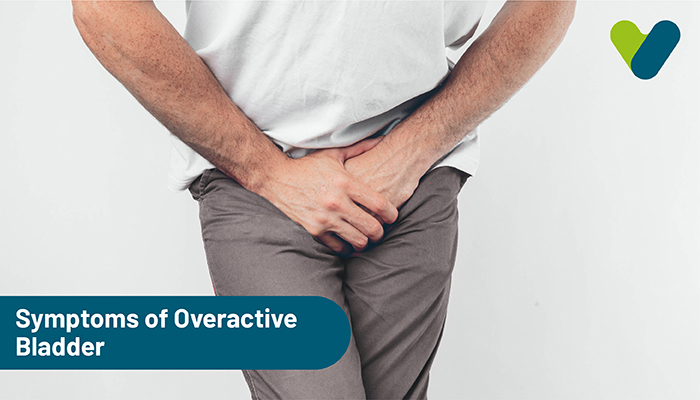What is an overactive bladder?
An overactive bladder or OAB is a chronic medical condition where there is sudden, uncontrollable urge to urinate at very frequent intervals. This condition can also trigger incontinence, which means involuntary loss of urine or leakage. OAB symptoms may be unpredictable, making its management challenging. Some people with the condition may reduce their social activities as a result, which may lower their quality of life. Additionally, it may result in emotional discomfort and loneliness.
You can manage your symptoms with the help of several treatments. Treating a weak bladder’s symptoms will be helpful to enhance your quality life and decrease the likelihood of incontinence.
Almost anyone, including children, adolescents, young adults, and older adults, can be affected by this disorder. But folks over the age of 40 are the ones who experience it the most frequently.
What are the overactive bladder symptoms?
If you have an overactive bladder, you may notice the following symptoms:- A sudden, unexpected urge to urinate that is very hard to control
- Incontinence followed by the sudden urge
- Frequent urination: trips to the bathroom can be around 20 times or more
- Waking up in the middle of the night at least twice to empty your bladder
You might even wake up mid-sleep sometimes if you have had a tall drink of water or some other fluid before bedtime. The frequency of the urgency to urinate and the number of times you act on that urge that are the deciding factors in the case of overactive bladder syndrome.
Possible causes of the overactive bladder symptoms
There is no singular cause that can lead to an overactive bladder. The reasons can vary from person to person. An overactive bladder is a result of detrusor muscle disorders or injuries. The bladder wall contains the smooth muscle fibres that make up your detrusor muscle.Pregnancy and childbirth: Your pelvic muscles may be strained and weakened during pregnancy and childbirth, resulting in abdominal injuries. The muscles and tissues in your pelvis support the lower abdominal organs. The posture of the bladder can sag from its normal state if the muscles in your pelvic region degenerate.
Neurological damage: There is a chance of pelvic nerve damage if you have ever had herniated discs or radiation therapy for prostate, colon, rectal, or uterine cancer. Multiple sclerosis, Parkinson's disease, and stroke are some more neurological diseases that can result in an overactive bladder.
Alcohol, caffeine, and medication: The use of medicinal diuretics, alcohol, and caffeine may cause your bladder to fill up quickly and perhaps even leak. Alcohol and caffeine are known to produce frequent urination, which results in water loss. The,n there are medications that, because they need to be taken with a considerable amount of water, make your body generate a lot of pee.
Infections, tumours, and stones: An overactive bladder may have a commonly recognised cause, a urinary tract infection (UTI). In this situation, you might also experience itching and soreness when you urinate. Incontinence may occur if you have bladder stones or a tumour in your bladder.
Diabetes: With poorly managed diabetes, bladder dysfunction is a possibility. You find it difficult to completely expel the urine from your body because diabetic bladders frequently retain urine. Consequently, you feel the need to urinate frequently. In both Type 1 and Type 2 diabetes, hyperglycaemia also contributes to frequent urination.
Hormonal changes: When there is a lack of oestrogen in the body during menopause, urinary incontinence may occur.
Weight gain and obesity: Obesity or being overweight can exert strain on the bladder, which can cause leakage or incontinence.
Overactive bladder in men: causes
An enlarged prostate is the cause of many cases of overactive bladder in men. The urethra, the tube via which urine leaves the body from the bladder, is encircled by the prostate gland. Many men who are treated for the symptoms of OAB are presumed to have a bladder obstruction brought on by an enlarged prostate. However, this does not apply for all cases of OAB in men.Older adults have a higher risk of developing OAB. A man's risk of having an enlarged prostate, which can cause OAB, increases with age. Getting your prostate checked out by a doctor can be helpful in ruling it out as a cause of issue. Routine check-ups of the prostate are also helpful in detecting other issues.
OAB symptoms can be brought on by bladder infections, bladder stones, or bladder cancer. OAB can caused on by neurological diseases such a stroke, multiple sclerosis, or Parkinson's disease that impair the nerves and cause the wrong signals to be sent to the bladder. Temporary conditions like constipation or drinking a lot of alcoholic or caffeinated beverages may make you feel the need to urinate more frequently.
Overactive bladder in women: causes
Strokes, MS, and Parkinson's disease might lead to OAB symptoms. OAB affects women who are overweight more commonly than those who have healthy weights. The risk of OAB in women may also be increased by conditions like menopause, ageing, and acute UTIs. OAB is a condition that affects a large portion of the elderly population, yet it is not thought to be a typical aspect of ageing. Alcohol and caffeine are both diuretics, which may make OAB symptoms worse. You will be referred to a urologist or a urogynaecologist to diagnose and resolve this issue.Overactive bladder in children: causes
Although it is a prevalent condition, not all accidents or soiled beds are caused by OAB. Overactive bladder symptoms in children typically go away on their own, but therapy can help stop frequent urination or difficulties. As kids age, OAB symptoms become less prevalent. Kids develop good bladder control and the ability to identify cues that they need to pass urine as they get older. Consult with your child's doctor if the overactive bladder symptoms don't seem to be going away or are becoming worse.Diagnosis of Overactive Bladder
- The doctor will take down your medical history and conduct a physical exam.
- Bladder stress test: This test measures the amount of pee leakage by filling the bladder (you will be asked to drink a lot of water) and making the patient cough.
- Postvoid residual volume test: After urinating, a catheter is inserted via the urethra and into the bladder to determine whether the bladder is totally emptying. The volume of any leftover pee is measured via the catheter.
- Urodynamic testing: This group of tests is normally only performed in exceptional circumstances. It analyses urine flow to check for any blockages or obstruction and assesses urinary urge sensation.
- Urinalysis: A urine test checks for the presence of germs and may screen out other illnesses including a UTI.
- Cystoscopy: By passing a long, thin tube equipped with a magnifying glass into the urethra, a cystoscopy is used to examine the bladder's interior. The doctor typically uses a numbing gel to reduce pain. They might give you general anaesthesia in exceedingly rare instances, which would make you unconscious.
Why is it important to know the symptoms of an overactive bladder?
A condition like this can undoubtedly lower your quality of life. You might feel ashamed to discuss your situation with your friends and family, which can marginalise and isolate you. Overactive bladder sufferers frequently experience emotional distress along with an impeded social life.Additionally, this disorder may have repercussions that affect your sleep, and sexual health. If you can recognise your symptoms effectively, you can tackle this issue immediately and significantly improve your overall health. You do not have to suffer because of an overactive bladder anymore. Rehabilitative steps can manage or even entirely eradicate the condition.
About 10% to 15% of Indians are afflicted with this condition. Reading about the symptoms, the causes, and gaining more knowledge on OAB can instil confidence to surpass social stigma, shame or embarrassment and reach out for help.
Knowing the symptoms can also help educate your loved ones about your experiences with OAB and how it affects you. This may help you build your own support system and lessen feelings of embarrassment. You might be surprised to discover how prevalent this issue is once you begin discussing it.
Treatment and management of overactive bladder
It takes time for an overactive bladder to go away on its own. If OAB is not treated, your symptoms could worsen, your bladder's control muscles can deteriorate, and the tissues in your pelvic floor might degenerate.Behavioural changes: Kegels, or pelvic floor exercises, help to strengthen the muscle that controls the flow of urine, as well as the pelvic floor muscles.
Lifestyle changes: You can regularise your pee schedule by planning bathroom visits for every couple of hours. Controlling and limiting their fluid consumption can also be helpful. However, you should be mindful to keep the fluid intake moderate. Bladder training entails postponing peeing while gradually increasing the time between trips to the bathroom.
Dietary changes: Reduce your intake of caffeinated beverages, alcohol, chocolate, tomatoes, citrus, spicy, and acidic items to decrease the effects of OAB. Don't, however, reduce your fluid intake. If that is done, your pee can become more concentrated, which might aggravate your bladder.
Medication: The next step is typically medication if behavioural therapies and lifestyle modifications fail to alleviate OAB symptoms. The most widely used OAB drugs are anticholinergics. Your doctor can decide the frequency at which you have to take them and the amount you need. To treat the symptoms of OAB in women, topical oestrogen that can be administered vaginally or as pills and creams. The most widely used OAB drugs are anticholinergics or beta-adrenergic agonists.
Botox: Botox is directly injected by into several areas of the bladder muscle. It is only partially paralysed to reduce overactivity, but there is still enough control for you to go to the bathroom. Botox does not last as long; the effect will wear off in about 6 months. Nerve stimulation: Controlling the nerve impulses in your bladder can help alleviate the symptoms of overactive bladder. The sacral nerves, which pass close to your tailbone and transmit impulses to your bladder, can be stimulated by inserting a short wire there. Since this is a minimally invasive technique, there is almost no discomfort. Percutaneous tibial stimulation is a different procedure in which nerve impulses are given to a nerve branch close to your ankle. This treatment helps to improve bladder control. The tibial nerve is stimulated percutaneously during outpatient surgery. A lot of patients need 12 weekly sessions, then follow-up appointments every month.
Natural therapies: These should be taken up after you consult with your doctor because they might interfere with your allopathic treatment. If your doctor okays them, then you can go for acupuncture, which is believed to relieve stress. However, there is insufficient data to support this claim. Use of essential oils, taking a mix of ayurvedic herbs or Chinese medicine can also help reduce stress and help with OAB.
Surgery: When all other methods have failed, bladder augmentation can be done to make your bladder larger using a portion of your own tissue. This is regarded as significant surgery and is rarely done. Most people discover that their OAB is controlled by a mix of lifestyle modifications and additional treatments.
Regularising bowel movements: Your bladder may experience pressure and experience it becoming less functional if you are constipated. By maintaining regular digestive habits, you might be able to prevent constipation and lessen the symptoms of the bladder. Eat enough fibre, eat at regular intervals, and exercise regularly.
Give up tobacco: Tobacco and nicotine are also irritants that can affect your bladder function, and lead to other health issues in the future. Urinary leakage may also result from coughing fits brought on by a smoker's cough.
Manage your weight: Being overweight or obese can put stress on your bladder that might exacerbate issues with bladder control. Maintaining a healthy weight helps relieve pressure on your bladder. You can do so with regular exercise and a balanced diet.
Takeaway It can be disheartening to live with a condition where you need to excuse yourself to relieve yourself. Then there is the possibility of unexpected leakage while you are in an office or social situation. There is considerable mental distress that comes with having OAB, but you do not have to keep living with the symptoms without any cure.
OAB is manageable and you can regain the life you once knew with medical intervention. Not only will a doctor give you clarity but approach your condition sans judgement. They can identify the underlying cause of your overactive bladder and collaborate with you to create the most effective treatment strategy. Contact a healthcare professional if you experience the signs and symptoms of an overactive bladder so you can efficiently manage your toilet routines and boost your quality of life.
Age-related OAB can appear gradually and deteriorate over time. If you experience severe leakage and a quick onset of symptoms, your OAB may be a sign of an infection or a neurological problem.
You cannot rule out the possibility that symptoms might never totally go away and managing treatment might be difficult. Adult diapers or disposable pads can help regain control and enhance your quality of life if therapies don't work for you or if you're waiting for them to start working. However, a lot of people are happy with the care they get for OAB and frequently see a significant increase in their life satisfaction.


